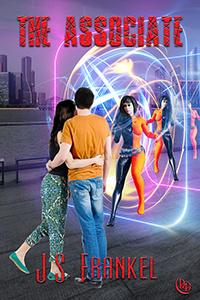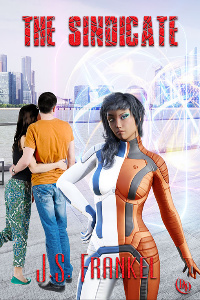Courage counts for everything.
Nate Holliday is your average teen, living a fairly ordinary life in Portland, Oregon. Born without a right hand, he copes with his disability the best that he can, although he still feels like an outsider.
His fairly ordinary life changes when he meets Ukiko Monaghan, a woman from an alternate Earth. Ukiko, known as Dividing Woman for her ability to split her body into multiple copies of herself, is after a violent criminal named Astral, who can summon up demons from another dimension.
Astral is aided by Tony Lethal, a thug who enjoys stomping people. Together, they are in search of the Spark, an all-powerful weapon, and Ukiko enlists Nate’s help in finding it before they do.
Now, Nate, along with his girlfriend, Melanie Sarkosian, have to avoid spectral demons, the various branches of the law, and curiosity seekers as they race to find the Spark before Astral does. It’s a hard journey, one fraught with danger, and Nate has to conquer his own demons before he can conquer those who seek to defeat him in his quest.
Sometimes, courage is all you need.

Portland, June seventh, eight AM, my home. My room. My domain.
“Nate, get a move on,” my mother yelled. From the echo, I mentally triangulated where it was coming from, and then decided it had emanated from the central focus of this abode—the kitchen.
“Nate!”
Aw, come on, let me sleep a bit more. This bed is comfortable.
“Nathaniel Andrew Holliday, get up!”
That roused me, and I opened my eyes, blinked, and felt a grimace form right away. My prosthetic sat on my night table. I didn’t need a mirror to tell me what expression I had going on. A right hand, crafted to match my left one, it looked almost the same as a human hand.
The key word was almost, but in reality, it was like the difference between night and day. I’d been born without a right hand.
My right forearm looked normal enough, but instead of a stump at the end of the wrist, the bone was wide and resembled a mini-mallet, hence the necessity for a prosthetic.
“Nate!”
My mother happened to be one of the nicest people around, kind and understanding, sympathetic to the max, but when it came time to eat, she turned into a cross between a gargoyle and a drill instructor. She bellowed, “Nate,” again.
Oh, and her voice—it sounded like a high-speed drill going right through the center of my brain. That got me up, that, and the fact that she’d used my full name, something she did only when she was pissed off or stressed out. Perhaps it was the latter, this time.
She shouted out my name again. This was the winner, and I yelled back, still half asleep, “Okay, I’m up!”
School day—Wednesday—and that signaled the middle part of the week. I got dressed, slipping into my pants and awkwardly pulling a shirt over my head with my left hand. I used my right arm as a prop to get things straight and then slipped it through. I’d been doing so ever since I was old enough to walk.
Everyone talked about the new three-D printed hands, mechanical hands that science had developed, hands that could grasp, and fingers that could move and therefore act like the real thing.
Sure they did. Television and movies gave the impression that you could look normal, be normal or be better than normal, if and only if you had money. With the right amount of cash, you could buy one and be the newest Bionic Person on the block!
We couldn’t.
Since I was a kid, I’d made do with slipping on the hand. It fit neatly over the stump and caused some swelling at night. Soaking it in Epsom salts was a routine I’d been performing almost every evening since I was little.
Fortunately for us impoverished people, a local hospital had a number of prosthetics on tap, and one of the technicians there used to measure my stump from time to time and reshape the prosthetic hands for me from the time I was small—or so my mother had told me. I’d used a variety of sizes over the years.
Initially, I’d used a hook instead of a plastic hand. That was when I was around five. But I’d never liked strapping it on, and it tended to snag on material or slash others by mistake, and I disliked people staring at it. A plastic hand was somewhat more unobtrusive.
“Stumpy.”
That was what some kids called me in elementary school. Or Captain Hook. Or Mannequin. Crap like that. It hurt, hurt so much that when I was seven, after a bully had poked fun at me and smacked me around, I walked home crying, and then I got some great advice from my father, advice I’d immediately taken to heart.
“Nate, some people think that it’s okay to make fun of others who are different. Some people think that it’s fun to put others down. It’s not. So, if you don’t get along with the other kids because you don’t like their personalities, or they don’t like yours, that’s okay. It happens.
“But it’s never okay to make fun of others because they’re physically different. When your mother and I saw you for the first time, we thought you were great, the best thing that ever happened to us. We still do.”
I wiped the tears that ran down my face. “So, what do I do, Daddy?”
“Get ready to learn something.”
My boxing lessons began on the same day. My father was no expert, but he knew enough to teach me how to keep my guard up, how to sidestep punches or block them, and how to punch. I was naturally right-handed, but I had to learn to fight with my left.
“The other kids, they’ll always go for your weaker side. They’ll think it’s weaker. That’ll mean they won’t be expecting you to fight this way.”
Over time, I developed a bobbing, weaving style of attack and defense. I sparred with my father and shadow boxed on my own. I also religiously watched kung-fu flicks and learned how to combine kicks and punches together.
While training, I also discovered something else. The stump was bone, as hard as a fist. Hitting someone with it hurt me, but it hurt them even more.
The next time the same bully picked on me, called attention to my disability and tried to start something, he got smacked in the mouth and lost two teeth.
I got sent to detention. After that, the insults still came my way, but less often. Fighting had never been something I liked, but sometimes it came down to having a brawl. Soon, I got the rep of being someone not to mess with.


